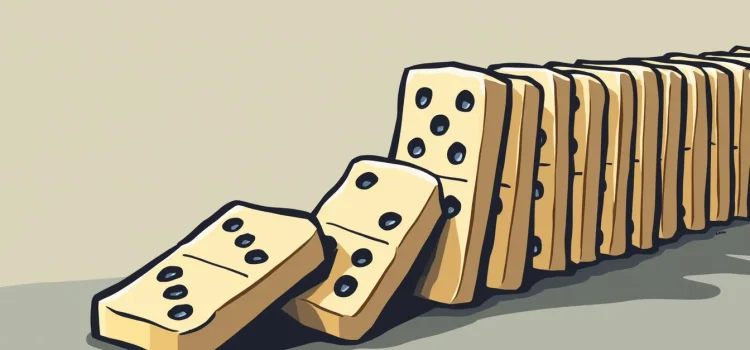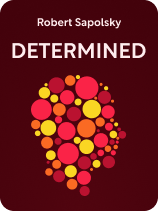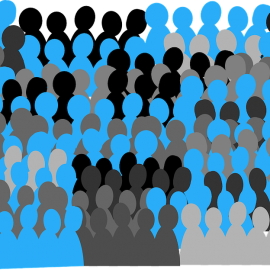

This article is an excerpt from the Shortform book guide to "Determined" by Robert Sapolsky. Shortform has the world's best summaries and analyses of books you should be reading.
Like this article? Sign up for a free trial here.
How well do you understand the concept of free will? Do you believe that your choices are truly your own?
In his book Determined, Robert Sapolsky explores the theory of determinism and its implications for human behavior. He lays out arguments against free will and shares how scientific advancements support his views on determinism.
Keep reading to discover how Robert Sapolsky’s determinism theory challenges our understanding of personal choice and responsibility.
Robert Sapolsky on Determinism
As explained by Robert Sapolsky, determinism is the idea that every event, from the most important to the most trivial, is the direct result of whatever happened immediately before it. Those occurrences, in turn, were due to what happened immediately before them, and so on. In short, determinism theorizes an unbroken web of events that reaches all the way back to the beginning of the universe.
Determinism also means that whatever happened was the only thing that could have happened at that moment, because it was determined by the moment beforehand. For example, think about what happens when you throw a ball: The moment you let go, the place where that ball will land has already been determined by the force of your arm, the angle of your throw, the wind, and countless other factors. The ball can’t simply choose to land someplace else—all it can do is travel along its predetermined path.
(Shortform note: Sapolsky’s strict deterministic view of the world closely resembles a theory that Sir Isaac Newton—who was a devoutly religious man as well as a scientist—proposed in the late 17th century, which is known as the Clockwork Universe theory. Newton’s theory states that God, being omniscient, created the universe in such a way that it would run perfectly without the need for any further divine intervention, just like a clock runs on its own after being wound. This implies that God already knew everything that would happen from the very moment of Creation; that, in turn, implies all of those events have been fixed in place since the beginning of time.)
We’ll explain two major reasons why Sapolsky believes free will doesn’t exist:
- By definition, free will means making decisions without any influences—otherwise, you’re simply reacting rather than acting freely. However, this is impossible because you’re always being influenced by your genes, experiences, and surroundings.
- Whatever “choice” you make is the only choice you could have possibly made, based on everything influencing you at that exact moment.
We’ll also discuss how scientific advancement supports Sapolsky’s theory that people aren’t in control of their own actions.
Determinism and Human Behavior
Applying the theory of determinism to human behavior would mean that anything a person thinks or does is simply a response to what happened the moment before. Moreover, it’s the only response they could possibly have—just like the ball from the previous example can’t land someplace besides where it’s going to land, the person can’t do something besides what they’re going to do. Innumerable different factors, both personal and environmental, come together to create that one inevitable outcome.
To give just a few examples of personal influences: Someone’s genetics, their physical and mental health, and their mood all affect their behavior. Even things that seem unimportant, like whether they’ve eaten recently, play a role; you probably know from experience that being hungry makes you irritable and more likely to snap at people.
Environmental influences on a person’s behavior include socioeconomic status, education, culture, friend groups, and how their parents or guardians raised them. Again, seemingly trivial things can affect their thoughts and actions—for instance, people tend to get short-tempered when it’s hot out.
Furthermore, each of those influences was itself influenced by whatever came before it. Therefore, determinism once again theorizes a string of causes and effects going back to the very beginning of time and insists that everything people do is part of that unchangeable string of events.
| The Age-Old Question: Nature Versus Nurture Sapolsky discusses these influences on people’s behavior in much greater detail in his previous book, Behave. He also addresses the issue of “nature versus nurture”; that is, how much do our innate tendencies affect our behavior compared to the things we experience throughout life? He concludes that, of the two, nurture has a much larger impact. Sapolsky explains that certain genes can predispose us to certain behaviors—for instance, it’s well known that alcoholism has a genetic component—but our experiences are what actually shape our thoughts and actions. So, if someone with genetic risk factors for alcoholism is raised to understand the risks of drinking, they might never start drinking at all. However, there’s also a growing belief among behavior experts that “nature versus nurture” was the wrong approach to begin with, and we really should be discussing “nature and nurture.” This is because nearly everything about us is the result of our genes interacting with our environment. For instance, we tend to think that height is genetic, but children with good nutrition grow taller on average than those without adequate food. Similarly, if someone never starts drinking, then it doesn’t matter how many genetic risk factors they have—alcoholism can only come from the interaction between those genes and alcohol. |
Argument #1 for Determinism: Influenced Choices Aren’t Free Choices
The crux of Sapolsky’s argument that human behavior is deterministic is: Your brain determines what you do, and all of the countless influences we discussed determine what your brain does. Therefore, what you experience as “making a choice” is really your brain processing all of the things influencing you at that moment and calculating a response.
For instance, you might think that you chose to have steak for dinner, when in reality you were being influenced by low iron levels that made you crave red meat and a sign advertising the local butcher shop that you saw on your way home from work. Then again, perhaps money’s too tight for steak, so you decided to make meatloaf instead—that’s another factor (your finances) further influencing the decision that you believe you made freely.
(Shortform note: Sapolsky’s assertion that we can’t claim to freely take action when we’re being influenced by numerous other factors bears some resemblance to the legal concept of coercion. Coercion means using violence or the threat of violence to force someone else to commit a crime. A successful coercion defense can often reduce penalties or get a defendant’s case dismissed entirely, because the defendant’s choices were being influenced by an outside force; their actions weren’t of their own free will. While this is an extreme comparison—most things that influence our behavior don’t directly threaten our lives—it does help to illustrate Sapolsky’s idea that we aren’t really making our own decisions, because other factors are always influencing those decisions.)
Argument #2 for Determinism: You’d Always Make the Same Choice
Sapolsky says another fundamental concept of determinism is that identical situations will always lead to identical outcomes. This logically follows from the idea that events are predetermined by the events leading up to them; if that’s true, then the same causes will always lead to the same effects.
We’ll apply this concept to human behavior with a thought experiment: Imagine that you’re standing in your kitchen right now, deciding what you want to eat. Now imagine that scenario playing out across an infinite number of identical realities, with an infinite number of identical versions of you. Would all of those “you”s choose the same snack?
If even one copy of you chose differently from the others, that would prove the existence of free will; since the starting conditions are exactly the same, free will is the only thing that could lead to a different outcome. Conversely, the deterministic answer is that every one of those infinite versions of you would make the exact same decision, thereby demonstrating that free will is a myth.
| A Philosophical Question: Are Predetermined Choices Still Choices? Sapolsky’s main point in Determined is that anything we believe to be a personal choice is actually the inevitable result of everything leading up to it. However, in doing so, he de-emphasizes the importance of personal factors such as our beliefs and values, when in reality they still have an enormous impact on what we end up doing. This raises a question of semantics: Given that our thoughts influence our actions, could it still be said that we’re making choices about what to do, even if those choices were predetermined? We can find an interesting interpretation of predetermined “choices” from a surprising source: the 2003 science fiction movie The Matrix Reloaded. In one scene, Neo (the protagonist) speaks to the Oracle, a computer program that can predict the future. During their conversation, Neo asks the Oracle if she already knows what he’s going to do next, and the Oracle replies that she does. He then asks, if that’s the case, how can he decide what to do? The Oracle’s answer is that he already made that decision, he just doesn’t yet understand why he made it. This exchange strikes an intriguing balance between determinism and personal agency. Neo’s actions are already set in stone before he’s aware of making any decisions (like all of us, if Sapolsky’s right). Therefore, what feels like making a decision is actually learning the reasons behind a decision that he already made long ago. However, those reasons include Neo’s personality, values, and abilities—what one might call his free will. Most importantly, they’re still Neo’s decisions and are no less meaningful for being predetermined. |
The Shrinking Role of “Free Will”
While discussing determinism and free will (or the lack thereof), Sapolsky points out that scientific research has repeatedly found underlying reasons for things that we used to believe were the result of personal choices. This suggests that “free will” is just a catch-all explanation to fill the gaps in our understanding of people’s behavior.
Therefore, the more we learn, the less we attribute to this nebulous concept of free will. For example, now that we know about conditions like clinical depression and ADHD, we understand that people with those disorders have chemical imbalances that affect their behavior, and they aren’t just choosing to be lazy or careless.
Following that trend to its conclusion, Sapolsky believes that if we somehow became omniscient, it would become clear that free will doesn’t exist. With no gaps in our understanding of human behavior, there would be no need for such a concept, nor would there be any way to fit it into our worldview even if we wanted to.
| The Stigma of “Laziness” As Sapolsky says, the more we learn about why people do the things they do, the less we blame on their personal choices. This is important not just because it gives us a better understanding of the world, but also because it’s helping us overcome the social stigma that comes with labels like “lazy.” Social psychologist Devon Price discusses this trend in terms of what he calls the laziness myth. In brief, Price says that our work-centric capitalist culture leads to some very harmful beliefs: It directly ties a person’s productivity to their quality as a person, and it insists that people can overcome any difficulty through hard work. Looked at from the other direction, this implies that people who are struggling (such as people living in poverty, or those with disabilities) are just lazy and not working hard enough—and, furthermore, that their “laziness” means they’re bad people. Price’s work emphasizes that what looks like laziness is always the result of other factors like fatigue, psychological disorders, or systemic barriers to education and employment. By recognizing this, and understanding that people aren’t struggling because of some personal moral shortcoming, he hopes that we as a society can shift our focus from assigning blame to finding solutions. |

———End of Preview———
Like what you just read? Read the rest of the world's best book summary and analysis of Robert Sapolsky's "Determined" at Shortform.
Here's what you'll find in our full Determined summary:
- Why some people believe we have free will—and others don’t
- Three implications of a world without free will
- Why we should live as though free will doesn’t exist (even if it does)






